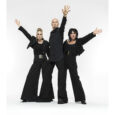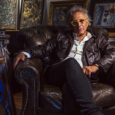OUR OWN LITTLE PLANET
A CONVERSATION WITH PEARL & THE OYSTERS
Planet Pearl, the latest album from Pearl & The Oysters, is undoubtedly one of, if not the best, jazz pop record of 2024. Juliette Pearl Davis and Joachim Polack offer intergalactic, mesmerizing tunes with the album. Planet Pearl is also the most personal album from Pearl & The Oysters and as Polack puts it, is “our own little planet.”
Davis says, “I hope it’s comforting in those really, really dark times. I hope it alleviates just some of the darkness. Most of the songs on the album are pretty, not sad, but pretty serious. The topics are pretty serious. But I hope they connect with it and sort of like when you listen to a sad song; sometimes, it can make you feel good. This like tension point. I hope this album does that.”
“It’s about uplifting spirits and moods and we’ve always tried to offer an experience that is one of just like happiness and communicate the joy we had making the music,” comments Polack. “At the end of the day, there’s nothing that can make me feel better about what we’ve done than hearing people say, ‘it makes me feel good.’ That’s amazing. We don’t necessarily go for, like, ‘everything’s perfect.’ That’s not what our music is about. But it’s nice when it lands on something that makes people feel good. We appreciate that, and we want that.”
Reflecting on being more personal on Planet Pearl, Davis states, “I think it can be a fuel to get creativity from this very intimate spot in your heart and get the music out through there. It felt good to create that bridge from our hearts to our audience. And show a bit more about our inside world and it felt like we were coming out of our shell in some ways.”
“I just think it was a natural evolution from the first album [Pearl & The Oysters], which was a bit zany and ‘fantastical world,” says Polack. “It was more about creating this cartoonish little thing. From that album to maybe Flowerland and Coast 2 Coast, there was already an evolution there inward, and I think we went a little bit further with the new one… It felt like the place to go for us, but it’s not something we expect of everything that we listen to, or we expect even from ourselves. And you know, the next album might be different.”
The sound and dynamics of Pearl & The Oysters have changed a lot. Having a bigger budget, access to a studio, and the ability to have more musicians on Planet Pearl compared to a more DIY approach helped evolve the sound. “The first album got vinyl release, which was amazing and got us super excited, but it came with the expectation to tour a little bit, and that kind of kickstarted this little process of making this two-person project into a live band,” notes Polack. “Being this sort of computer layered, at home, bedroom pop project to something that is more informed by the fact that we are now, in fact, a live band and when we go into the studio, we track the rhythm sections with drums and bass and guitar in a way that more resembles how records used to be made when you had a band… Planet Pearl is like the first album that systematized that way of doing it.”
“When we first started, we didn’t even think we would tour,” highlights Davis. “The live band wasn’t really on our mind. We were really in the perspective of a bedroom studio, crafting little songs, and trying to find our sound.”
They both had a jazz upbringing, and Planet Pearl sees them utilizing this more than ever. “It’s something that we didn’t really use, that side of us in the first few records,” says Davis. “More and more, we dive into our love for jazz. We’re just more freely expressing that side of us.”
This love for jazz is especially prevalent with “Side Quest” and “Cruise Control”. “There was this one keyboard that I kind of fell in love with during those sessions called the RMI Electra,” shares Polack. “It’s not quite like a Rhodes or a Wurlitzer but something that was commercialized as the cheaper alternative. And it sounds very much like its own thing, which I love. Basically, that’s the keyboard that was the backbone as a rhythm harmonic instrument in both songs… We did track them live and then overdubbed a little bit.”
Initially, the demo of “4D” was a keyboard song, but they shifted it to a guitar song. “We’re a very synthesizer and keyboard-driven band, but we try to have a guitar-based song in all our albums,” comments Davis. “It’s more like the bedroom recording side of things—layering instruments and getting those guitars as crunchy as can be. I’m thinking of T. Rex as an influence.
Polack loved making “4D”. “In terms of pop production, something I’m always so fascinated with is really unique and idiosyncratic distortion sounds on guitar. I always try to find my pocket where I can make something that doesn’t sound like contemporary rock production, but I use the distortion in the guitar in a way that is appropriate in Pearl & The Oysters… “4D” was so fun to make. I was so excited. I always like to rock out to it at home.”
They are originally from France but eventually moved to the United States. “The French scene, the market is much smaller and perhaps a little less room for people that don’t fit within preestablished labels,” explains Polack. “It felt like that at the time, and I don’t shy away from saying it in interviews, it felt like we didn’t really belong for a while when we were in our late teens and early 20s trying to make music in Paris. It was difficult. I think there is a place for the kind of music that we were trying to make then and what we’re making now. There is a place for that. It’s just harder to find than in the States and North America as a whole, where the market is so big. There’s just so much more room for like sub sub sub genres and like really niche things.”
They both studied music academically for many years. This left a significant imprint on them and impacts the music of Pearl & The Oysters. “It’s very much informed by the fact that we did study music from a very systematic theory driven way,” says Polack. “It just shaped my brain to think about music in a certain way and even writing music because now I have some muscle memory automatic things that I do because I know it works. It’s definitely informed by our aspirations as musicians to learn as much as we could because we were music nerds, and we were obsessed. I’ve always studied classical and jazz with the purpose of bringing that into a pop type of idiom, like making songs with it… We were introduced to things we would have never even thought of as something that could be inspiring.”
The Omnichord is an integral piece of the sound of Pearl & The Oysters. “I didn’t bring much gear when I moved to the U.S., but the Omnichord was kind of non-negotiable,” says Polack. “The Omnichord has staying power. It’s on literally every album and a signature live thing… I think that it has a tendency to be used as a novelty or a gimmicky thing and we use it as one part of the sonic palette… It’s like magical. But some bands don’t want that. But we always embraced that kind of sparklines. I just love that. It’s like ear candy to me.”
Davis adds, “It felt like something that could link our sonic identity. It just had an important place from the start. Now, it still adds sparkles of magic to the songs we make.”












